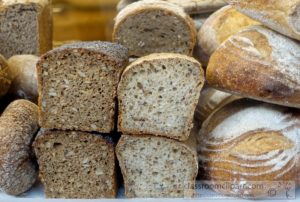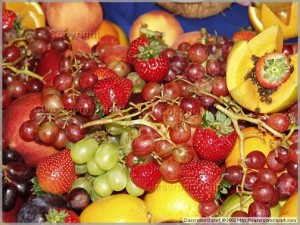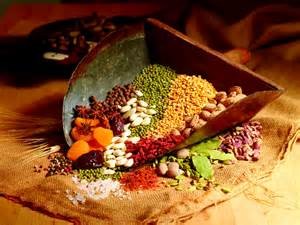Carbohydrates: What are they?
- Sugars, simple carbohydrates: sucrose, glucose, fructose, lactose, dextrose, high fructose corn syrup.
- Sucrose, glucose and fructose are naturally in fruits and vegetables (including sugar cane and sugar beets), that is what gives them their sweet taste.
- Lactose is naturally in all mammalian milks (human, cow, goat, sheep…)
- Sugar is refined from sugar cane, sugar beets, agave plant to be used as added sweetener in many foods.
- High Fructose corn syrup is made from corn; it is not naturally occurring.
- Honey, maple syrup, agave syrup are ‘natural sugars’ but have the same effect on our bodies as cane sugar, beet sugar, and high fructose corn syrup.
- Fruit juice includes the sugar and water that is naturally in a fruit; drinking it has the same effect on our bodies as eating other sugars.
- Fruit juice concentrates are often used to sweeten foods that are labeled “no sugar added”, such as fruit snacks. This is misleading; fruit sugar is sugar!
- Starches, complex carbohydrates: Long chains of sugars
- Starches are the carbohydrates in grains, beans, potatoes, and other ‘starchy’ vegetables
- Starches can be refined (e.g. white flour, white rice, corn starch, tapioca starch), and contain very little if any fiber
- Refined starches are easily digested into sugar molecules and absorbed into our blood stream.
- Fiber: soluble and insoluble fiber
- Fiber is not digested and absorbed into the blood stream, but is very important for health
- Soluble fibers are naturally occurring in many whole grains, fruits and vegetables, nuts and seeds, legumes.
- Soluble fiber helps lower blood cholesterol by keeping cholesterol in foods from being absorbed and by extracting cholesterol from the bile that helps us digest fats.
- Insoluble fibers are naturally occurring in wheat, and other whole grains as well as fruits and vegetables; insoluble fiber is found in higher amounts in foods than is soluble fiber; most fiber containing foods include both soluble and insoluble fibers.
- Insoluble fiber helps add bulk to our stool and maintain bowel function.
- Fiber helps slow the digestion and absorption of starches and sugars, which in turn helps maintain healthy blood glucose level
- Fiber helps keep our intestinal bacteria healthy, which in turn is thought to improve our immune function and prevent a variety of diseases (heart disease, diverticulosis, and many cancers)
- Eating carbohydrate foods in their whole forms (fruits, vegetables, grains, legumes, nuts and seeds) allows us to get fiber along with starches and sugars.
- See post on carbohydrates for people with diabetes: https://loribrizee.com/2014/07/what-are-carbs/
What’s wrong with sugar?
- Sugar has been labeled as absolutely evil in recent days. In and of itself, sugar is a good source of energy for physical activity and for our brains. The problem is that we eat WAY TOO MUCH OF IT!
- Sugar is needed are during endurance athletic events. Sugar is quickly used to give us energy to continue running, swimming, biking…
- Sports drinks have sugar content similar to that in our blood, so they are easily absorbed while we are being active.
- Home made ‘sports drink’: 40% juice to 60% water (about 13 ounces fruit juice to19 ounces water) + a pinch of salt (1/4 tsp to 1 quart diluted juice)
- The only times ‘sports drinks’ are necessary are when you are being continuously active for over an hour; this is especially important if it is hot out and you are sweating profusely.
- If you are doing an activity with periodic breaks, you can drink plain water and eat fruit for sugar and something with a little salt to meet your needs (e.g. crackers or a sports bar) .
- Sugar is needed if your blood glucose level is low (e.g. a person with diabetes who takes insulin or another medication that can cause hypoglycemia). If you fall into this category, talk with your Registered Dietitian or Certified Diabetes Educator about how to prevent and to treat low blood glucose levels.
- Sugar is needed are during endurance athletic events. Sugar is quickly used to give us energy to continue running, swimming, biking…
- Eating high amounts of sugar (and refined carbohydrates) results in increases in blood triglycerides and cholesterol, which in turn increases our risks for heart disease. Recent research suggests that sugar is far more of a problem than saturated fats! Excess sugar also contributes to excess weight gain!
- Read food labels; if sugar (or any of the above terms for sugar) is close to the top of the ingredient list, that food is high in added sugar. New food labels are coming soon; they will tell you how much ADDED SUGAR is in a food, in addition to telling you the total amount of sugar in a serving of food.
- Your goal is to limit ADDED SUGAR. Foods that are naturally high in sugar (fruits, milk, plain yogurt and vegetables) are NOT a problem.
- An occasional dessert is fine; a good goal is to limit your day to day intake of added sugar throughout each week–we don’t want to eat more than the equivalent of 2-3 tablespoons of ADDED sugar in a day (25-37 gm sugar or 100-150 calories from added sugar).
- You need to count fruit juice as part of your sugar–once you have squeezed out the juice and thrown away the pulp, you have mainly sugar water (8 ounces of 100% apple juice contains about 30 gm sugar; when you eat a 8 ounce (2 apples/pound) apple you get about 23.5 gm sugar, BUT you also get 4.2 gm of fiber; which one is going to be most satisfying?)
- Sugar: https://www.health.harvard.edu/blog/eating-too-much-added-sugar-increases-the-risk-of-dying-with-heart-disease-201402067021
What’s the problem with “refined carbohydrates”?
- Foods high in refined carbohydrates include anything made from white flour, as well as white rice, ready to eat cereals that may be sugar free but have little to no fiber (e.g., Corn Flakes, Special K™, Rice Krispies™, Corn Chex™, Rice Chex™)
- Refined carbohydrates are a short step away from sugar, as they are very easily digested into sugar and absorbed into the blood stream, in turn putting us at risk for increasing blood glucose, blood cholesterol and triglycerides.
- Try to limit refined carbohydrates to occasional treats
- Refined carbohydrates versus high fiber carbohydrates: https://www.ncbi.nlm.nih.gov/pmc/articles/PMC2869506/
What carbohydrates should I eat to be healthy?
- WHOLE grains. Try wheat berries, wheat bulgar, brown rice, quinoa, millet, oats, barley.
- Whole grain products. Bran cereal, whole wheat pasta, brown rice and/or quinoa pasta, 100% whole grain breads
- Look at the fiber content of packaged foods, you want at least 3 gm fiber for every 100 calories or 25 gm carbohydrate (more is better)
- Legumes. Beans, peas and lentils. These are especially high in soluble fiber, so very helpful for lowering blood cholesterol.
- Whole fruits, fresh, frozen or dried. Get your sweet fix from fruit so that you get your sugar packaged with fiber; stay away from fruit juices, fruit snacks as well as canned or frozen fruits that have added sugar (some people with diabetes need to keep fruit intake low to help prevent spikes in blood glucose levels).
- Starchy vegetables such as winter squash, sweet potatoes, yams, potatoes with the skin, peas, parsnips, turnips.
- Vegetables that such as broccoli, cauliflower, lettuces, spinach, kale, cabbage, summer squash, tomatoes…. give some carbohydrates, and are high in fiber.
Check out these posts for recipes using healthy carbohydrates:
https://loribrizee.com/2017/02/1107/
https://loribrizee.com/2017/03/butternut-squash-soup-recipe/
https://loribrizee.com/2016/10/1026/
https://loribrizee.com/2015/04/a-simple-inexpensive-super-food/
https://loribrizee.com/2016/01/887/



